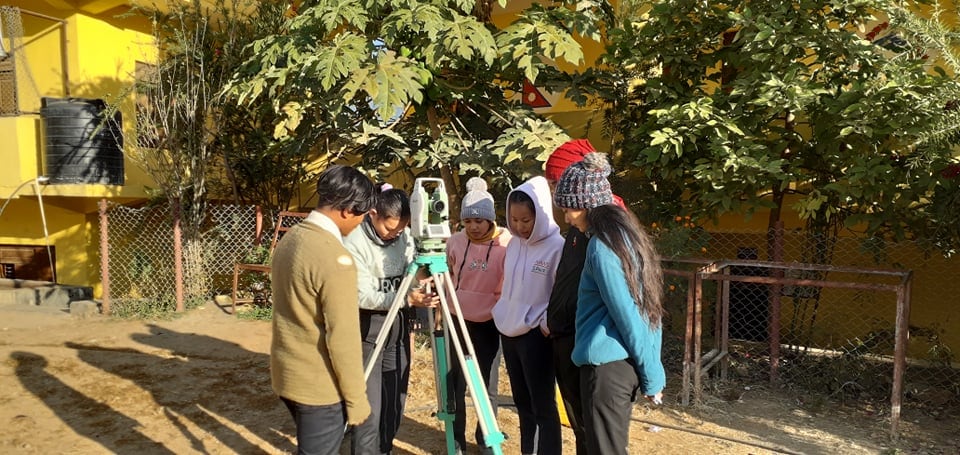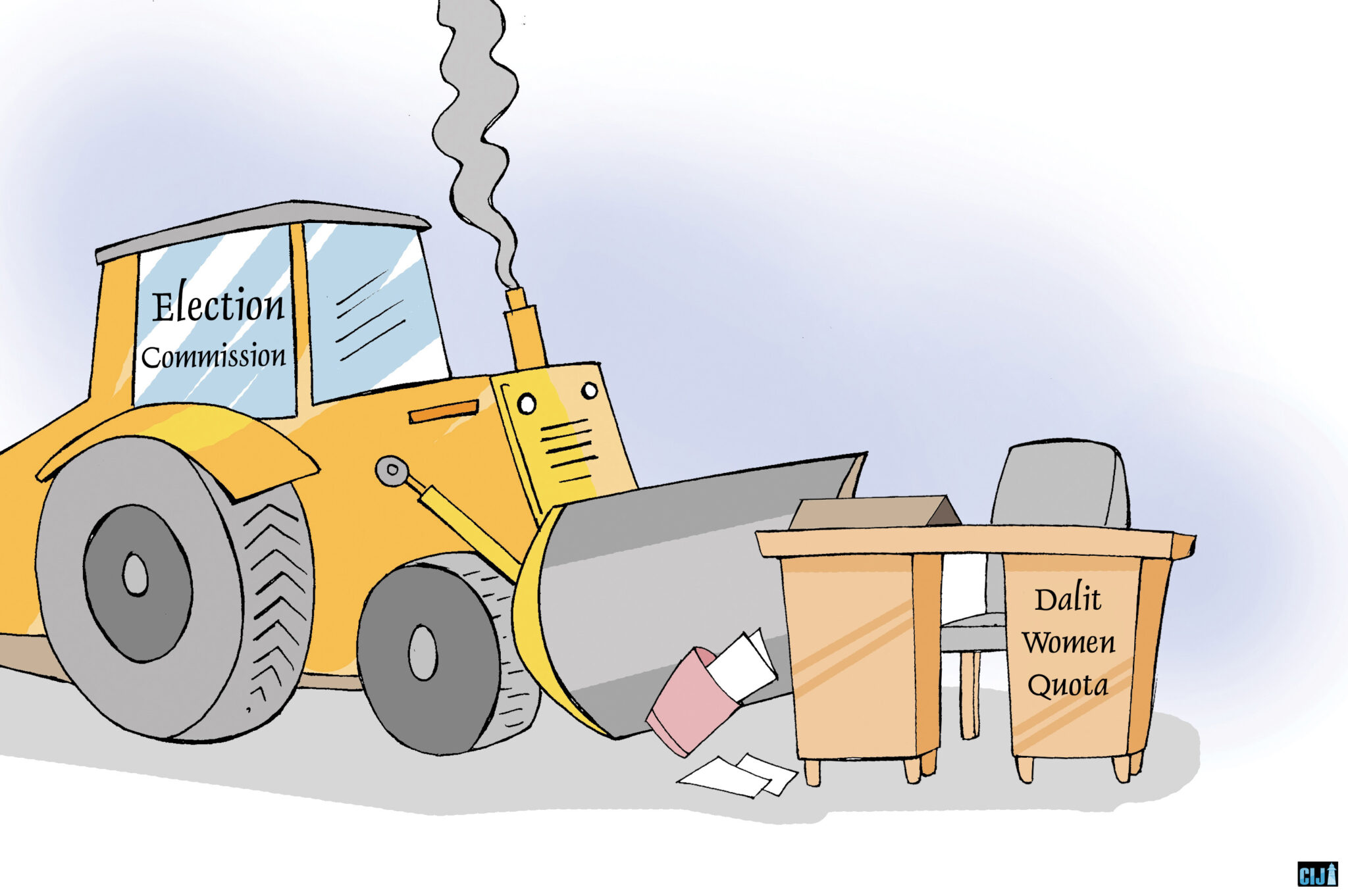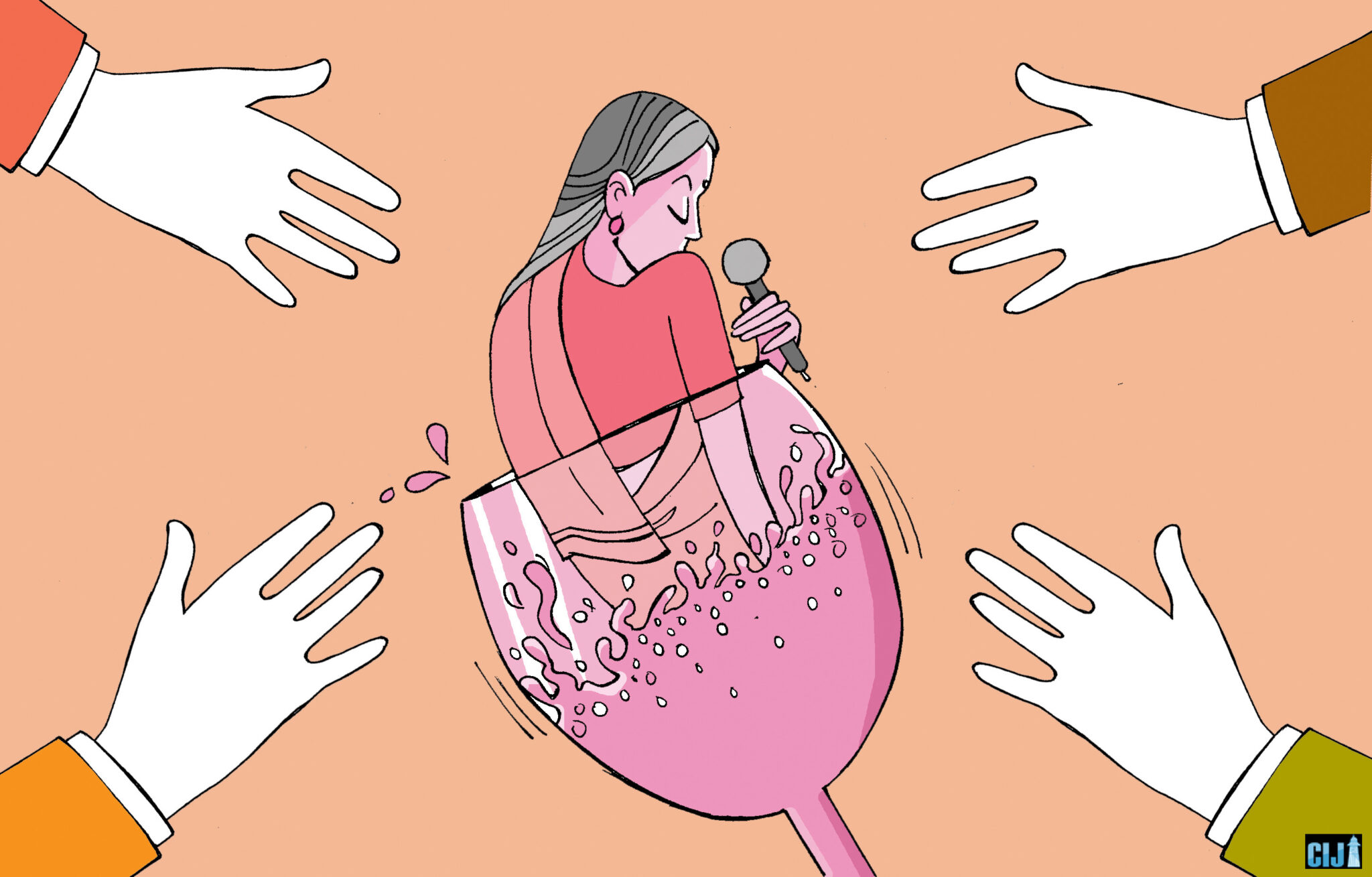While some local governments fail to exercise their right to manage schools in their jurisdiction, Triveni Rural Municipality has done an exemplary job. Other rural municipalities of the district are also following suit.
Mahesh Neupane | CIJ, Nepal
Although Triveni Rural Municipality in Rolpa launched its ‘Prosperous Triveni’ campaign, hundreds of children who were supposed to be in school were leaving their homes in search of work. Chairman Santa Kumar Wali decided to do something about it.
He came up with a strategic plan to get children, who had been working in brick kilns and other areas, back to school.
The first step was to pass five laws to make the rural municipality child labour-free within five years and ensure that they receive school education. The rural municipality with seven wards is all set to become the first in Lumbini Province to declare itself child labour-free by mid-January.

A nurse looks after students in the nursing room of Janajagriti School, Jugar.
In accordance with the strategic action plan, the village municipality recorded the details of the children who were out of school by conducting a survey. According to the survey, a total of 227 children had gone to work in brick kilns in Kathmandu as well as other cities of the country and India. The survey also found that most children were forced into labour as their parents were poor and couldn’t afford to send them to school.
Following a decision by the rural municipality to recall these children, 173 school-age students have returned home and have been enrolled in various schools. Nine children working in various hotels and restaurants in the village municipality have also been released.
Even after children were brought back to school, it was not easy for them to stay in school until their families were provided for. Therefore, the rural municipality provided books and school uniforms to the children by coordinating with various non-governmental organizations. “We have assisted the families of the poor children who are facing problems related to their livelihood. We trained them in goat and poultry rearing and vegetable farming,” said Chairman Wali.
The rural municipality has assisted 29 households for raising pigs, 74 for raising chickens, and 126 households for raising goats. Similarly, 23 people have been trained in house wiring, 16 in sewing, 15 in masonry, 10 in carpentry, 10 in hair cutting, nine in cooking, nine in running beauty parlours and four in motorcycle repair.
Assistance in training and income generation has made it easier for children to attend school. The rural municipality has deposited Rs 3.8 million in the Children’s Fund set up for the children forced to work due to their economic condition. “We have been helping the returned children from this fund,” said Hira Budhamgar, head of the women, children, and senior citizens’ department.
Exemplary environment in schools
Triveni is the first in the district to provide nurses at all the 12 secondary schools in its area. The nurses have been assigned to provide first aid when necessary as well as make children aware of reproductive and sexual health of adolescents, menstrual hygiene, and violence against them, said Purna Budha, head of the health department of the village. The nurses are also responsible for the management of drinking water and sanitation in the school as well as conducting vaccination programmes and running health education campaigns.
Ayusha Ghartimagar, a staff nurse at Janajagriti School, Jugar, says, “Since I am a woman myself, teenagers talk to me openly about menstruation and reproductive health.” The school attendance rate has also increased as their problems have been addressed, ”she said. Amrita Budathoki, education officer of the rural municipality, says that the one-school-one-nurse programme has changed the education system of the village.
“While in the classroom, I was always worried about how to manage my periods. This problem has disappeared after the school nursing programme,” says Vinita KC, a class 10 student at Janajagriti. Most of the female students didn’t attend school for three/four days during their menses.
The nursing service was started in the school in partnership with the federal and local governments. The government of Nepal contributes 90 percent and the village municipality contributes 10 percent to meet the expenses.
Village municipality without private schools
Triveni has integrated private schools in its area into government schools, calling for an end to the discrimination between private and government education and for providing equal quality education to all. Similarly, government schools with a low number of students have also been merged with other schools nearby.
Shikhar Jaljala Academy Boarding School, Jugar, which was running classes from nursery to grade 10, has been merged with Janajagriti High School. Following the merger, the Ministry of Education recently selected Janajagriti as a model school. The school also prepared a five-year master plan to implement the model school development programme from this year.
The school runs classes from nursery to grade 10 in both Nepali and English medium.

Students at Child Welfare High School, Liwang, on a scholarship from Rolpa Municipality.
Similarly, privately-run Motherland Educare Academy has been merged with Shukra High School, Jhumlung, Rolpa Sunrise English Boarding School has been merged with Birendra High School and Budhagaun Motherland Academy has been merged with Saraswati High School, Lingdung. After the merger of all the private schools, all schools in Triveni are now run by the local government.
Three government schools with low student numbers (Janajagaran Basic School, Khalichaur, Navajyoti Basic School, Darimchaur and Janamilan Basic School, Dharamkhola have been merged with other government schools nearby (Janagariti Secondary School, Jugar, Arniko Secondary School, Nuwagaun and Saraswati Secondary School, Kaulabato).
Some classes in government schools with low enrollment have been relocated to other schools. Grades 4 and 5 of Balseva Basic School, Japka, have been merged with Shiva Secondary School, Dwarpani, and grades 6, 7, and 8 of Janasewa have been merged with Saraswati School, Lingdung. At present, only up to grade 3 is taught at Balseva Basic School and only students of up to grade 5 attend Janasewa Basic School.
Triveni Rural Municipality provided Rs 500,000 for secondary schools, Rs 300,000 for lower secondary schools, and Rs 200,000 for basic schools that opted for mergers. Amrita Budathoki, head of the education department of the rural municipality, says her office has a policy to prioritised providing services to the schools that opted for mergers.
Parents say that with the integration of private schools into government-run ones, the quality of education has also improved. With the adjustment, private school teachers have started working at government schools. “Most of the schools now have English medium education,” said parent Khusiram KC.
According to him, school integration has been agreed upon only on the condition of making the quality of education better than in private schools. “When my children, who were studying in private schools, were enrolled in the government schools, I was wondering what the education would be like, but now we are confident it is good,” KC said.
Rural Municipality Chairman Shantakumar Wali says that even though the teachers of private schools have been integrated into the government schools, the principals of the private schools haven’t been given any compensation. “To ensure that everyone gets the same quality education, the adjustment has been made with the consent of private school principals and parents,” says Wali.
Private school operators have complained that they have not received any money from the Ministry of Education for the adjustment of schools. Maniram Ghartimagar, then principal of Shikhar Sunrise Boarding School, Jugar, said, “We signed up to help the rural municipality’s campaign. But we haven’t received any compensation yet.
Investment in technical education
Since the local government was authorised to run the education system, Rolpa Municipality has been giving scholarships every year to students to study diploma courses in crop science, animal science, engineering, and information technology. The municipality, which allocated Rs 4 million for scholarships in the first year of the programme, has been allocating Rs Rs 3 million every year thereafter for such scholarships. In the first year, 55 students received the scholarship, 51 the next year, and 62 in the next.
This year 19 students are studying Diploma in Civil Engineering, 13 Diploma in Animal Science, 10 Diploma in Plant Science, and 16 Diploma in Information Technology.

Triveni Rural Municipality has assisted the parents of children returning to school.
Mahendra Parajuli, chief administrative officer of Rolpa Municipality, said that the education policy in the works will make it compulsory for the students who receive scholarships to volunteer in the municipality for one year after completing their studies.
Bikash Gautam of Rolpa-4 says the municipality has provided scholarships to financially weaker students. “My parents, who are raising a family by doing daily wage work, do not have the means to send me to an engineering school. But I can now study on a municipal scholarship,” says Gautam, a fifth-semester student pursuing a diploma in civil engineering at the Bal Kalyan Technical School.
Similarly, Madi Rural Municipality has launched a programme to provide 100 percent scholarship to three students to train as health assistants and agriculture technicians. For this, the village municipality has allocated a budget of Rs 480,000 this fiscal year.
Parivartan Rural municipality has also made an arrangement to provide 50 percent of the total cost for MBBS students this year. The village municipality, which has provided 50 percent scholarship for higher education studies in agriculture and animal health, has also started giving scholarships to 30 high school and undergraduate science students. Ward 5 has allocated a budget of Rs 585,000 to train 10 students as agriculture and animal health technicians
Triveni Rural Municipality has allocated Rs 100,000 for every student who wants to study for a diploma in animal health and agriculture. The rural municipality has awarded scholarships to 14 students studying crop science and 14 studying animal health sciences.
Runtigadhi Rural Municipality has made provisions to send nine students from each ward under its full scholarship programme to train as enterprise development facilitators. They are currently studying at Sunchahari Technical School, Ghorahi, Dang. The scholarships given by the rural municipality have also enabled students from poor families to pursue technical education.
Grant to reduce the burden of parents
According to government figures, 252 teaching positions at the primary level, 431 in the lower secondary level, and 298 at the secondary level are still vacant in the Rolpa district. In Rolpa’s Sunchahari Rural municipality, which has 4,635 students, the government hasn’t allocated a quota for a single teacher at the secondary level.
Dinesh Subedi, a journalist based in Rolpa covering education, says that no one has paid attention to Rolpa’s education for a long time as the government hasn’t allocated enough teachers who are considered the backbone of school education. According to Subedi, the local governments of Rolpa have recently started paying attention to the issue even though the federal and state governments haven’t done so.
“Since I am a woman myself, teenagers talk to me openly about menstruation and reproductive health. The school attendance rate has also increased as their problems have been addressed ”
Ayusha Ghartimagar, staff nurse
The grant teacher management programme started by one local government in Rolpa last year has now been implemented by all local governments in the district. The 10 local governments of the district have allocated a total budget of Rs 112 million for the programme. From the budget, 464 teachers have been appointed in different schools of the district. With this initiative from the local governments, the financial burden on parents who had been paying school fees for a long time has been reduced.
The government hasn’t allocated any teacher quota to 39 schools in Rolpa Municipality (four secondary, 11 lower secondary, 15 primary, and nine child development schools). Chief Administrative Officer Mahendra Parajuli says that the municipality has appointed volunteer teachers in 39 schools. “We have recruited teachers at secondary, lower secondary, and pre-primary levels and sent them to work by providing salaries of Rs 20,000, Rs 15,000, and Rs 10,000 respectively,” says Parajuli.
Lal Bahadur Kunwar, chairman of Tara Higher Secondary School Management Committee, says that the parents of community schools in the town had been paying more than Rs 27.6 million to private schools employing 170 teachers before the municipality provided volunteer teachers. This programmes has reduced the parents’ financial burden, he added.
Parivartan Rural municipality has created 68 new teacher posts and paid their salaries itself. Earlier, parents spent a total of Rs 14.3 million every year on teachers.
Gangadev Rural Municipality, which has invested the most in the teachers’ salary, has appointed a total of 167 teachers at all levels and allocated a budget of Rs. 43.4 million. Madi Rural Municipality has appointed 44 teachers and sent them to schools. A budget of Rs. 16 million has been allocated for this.
Lungri Municipality, which has appointed 35 grant teachers, has allocated Rs. 11 million for the project. Triveni has also reduced the burden on parents by allocating a budget under the title of teacher grants. The municipality has added a Rs 2,000 allowance to the salaries being provided by the government for child development facilitators and school staff and has allocated Rs 6 million for 26 teachers.
Similarly, Sunil Smriti Rural Municipality has provided a teacher each to all 20 schools in its jurisdiction. It plans to spend Rs 6 million on this during this fiscal year. The municipality has hiked the salaries of child development facilitators and school staff by Rs 2,000.
Thawang Municipality has appointed 16 grant teachers. The municipality has allocated Rs 4.5 million for teachers’ salaries alone. Sunchahari Rural Municipality, which hasn’t received any government quota for teachers in secondary schools within the municipality, has appointed 20 grant teachers. The rural municipality has allocated Rs. 5.3 million for this and has made arrangements to provide a salary of Rs 10,000 for child development facilitators and school staff.
According to Madhusudan Pokhrel, principal at Bal Kalyan Model Higher Secondary School, Liwang, the local government’s efforts to develop the education sector is commendable. He says, “The budget allocated by the local government for grants and mobilization of volunteer teachers has played an important role in reducing the financial burden on parents.”



